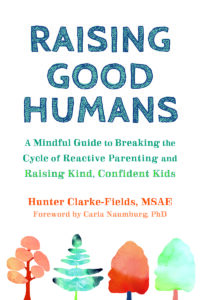Raising Good Humans by Hunter Clarke-Fields (Book Excerpt)
 There are probably a lot of wonderful things about your parents that you want to pass down to your child: creativity and encouragement, open and honest discussions, and your mom’s special pancake recipe. Reactivity? Explosive anger? Um, no.
There are probably a lot of wonderful things about your parents that you want to pass down to your child: creativity and encouragement, open and honest discussions, and your mom’s special pancake recipe. Reactivity? Explosive anger? Um, no.
Once you establish a steady meditation practice, you can expect your reactivity to reduce over time. It’s certainly helped with my explosive anger problem. But we can do more to help excavate your inner Zen-mama or papa. In this chapter, I’m going to share an exercise that will help you understand why you’re triggered. On a practical basis, we’re also going to talk about how to yell less and some practices you can use in those heated moments to help you chill out and become less reactive.
Kids Bring Up Our Stuff
The early years of parenthood can make us feel like we’ve totally lost our marbles. We are under intense psychological strain. We’re back in the parent-child relationship and it’s hard to recognize how much we’re bringing all of our baggage from the past. For me, when my daughter didn’t listen, it brought up my unresolved issues around not feeling heard. But at the time, I had no idea this was going on. Anger would well up like I hadn’t felt since I was… a child. Before I did the excavation work to understand what was triggering me, I blamed my daughter. What’s wrong with her? Why won’t she listen to me? It was clearly all her problem. If I could fix her behavior, then everything would be better. Right?
Like little spiritual masters, children have an uncanny ability to reveal our unresolved issues. Something about your parenting experience is driving you bananas? There’s your inner work. It might just be the fast-track to enlightenment. Want some major personal growth? Six-months with a preschooler can be more effective than years alone on a mountaintop.
All snark aside, it can be truly helpful to see your times of parental difficulty and challenge as opportunities to heal old wounds. As we heal our inner hurts, we can show up with more presence for our children—allowing us to be a comforting presence for them when they are hurting, and helping us to hold our firm boundaries with compassion.
We began this chapter with a quote from Dr. Dan Siegel, “the best predictor of a child’s well-being is the parent’s self-understanding.” What this means is that when we understand why we are so reactive—what old patterns and wounds are being triggered for us—then we can practice to heal and choose a different way of being, rather than repeating dysfunctional family patterns. Then we have a chance to refrain from unwittingly passing this baggage onto our kids.
Dan Siegel and Mary Hartzell explain this beautifully in Parenting from the Inside Out (2004):
The intrusions of unresolved issues can directly influence how we know ourselves and interact with our children. When unresolved issues are writing our life story… we are no longer making thoughtful choices about how we want to parent our children, but rather are reacting on the basis of experiences from the past… We often try to control our children’s feelings and behavior when actually it is our own internal experience that is triggering our upset feelings about their behavior.
I bet you remember plenty of moments when your child said or did something that triggered an outsized reaction from you when your internal response seemed out of proportion. I’ve had many of these moments. We all have them.
Seeing Your Issues Clearly
Understanding why you are triggered will help you respond more thoughtfully. Without awareness, we react out of old conditioning—that’s when your mom or dad’s voice flies out of your mouth. So if, for example, you are aware that you were raised to believe that little girls should always look clean and pretty, you’ll understand why your brain is freaking out when your daughter walks barefoot through the mud and gleefully streaks it all over her face. Knowing that this discomfort is your stuff and not hers, you can practice some restraint (deep slow, breaths!) and interrupt any old, harmful patterns of shaming and blaming your child.
With your meditation practice and the work you’ll do in this chapter, you’ll start to understand when you are present and responding thoughtfully, and when you are reacting out of old conditioning. You’re going to boost your self-awareness, which will absolutely make parenting easier in the long run. Knowing that your reactions come from you own stuff can help you step back a bit in many parenting situations. Rather than screaming about the spilled juice, we can sigh it out, take deep breaths, or even walk away for a moment to regain some equilibrium. Remember, however, we all parent partially with awareness and partially without—and that’s fine. Your goal is to simply increase your self-awareness bit-by-bit, day-by-day. Don’t expect to transform into an enlightened, perfect parent.
Sam’s Story:
Sam was taking some time off from her work as a university admissions counselor to stay at home with her two year-old daughter and her baby boy. Working with the exercise below, she discovered that wounds from the past were driving many of her feelings and actions. One afternoon she had just cleaned the house when her two-year old daughter spilled orange juice all over the kitchen floor. Sam lost it. She kept thinking, “I can’t believe I just spent money and time cleaning this house! She’s not even apologizing for it!” Her trigger? Perfectionism. She had been brought up to believe that physical appearance was very important. She discovered that wounds from her past were driving many of her feelings and actions. She realized how outsized her reaction was for a two-year old’s spill. By looking back at how she was raised, she could see that her anger was coming from her own conditioning.
She also discovered an old wound around not being heard when her daughter didn’t listen to her right away. She realized that she felt overlooked, not seen. By taking time to uncover these issues, she remembered her family constantly telling her not to be “so sensitive,” and to “toughen up.” Her feelings drove her to react with more aggression and irritation than the situation warranted. She knew if these issues remained unconscious and unresolved, she would just pass on her baggage to her daughter.
If we never look at our old wounds and triggers, we’ll continue to respond out of habit from the past, and probably pass our hurts down to our children. Becoming conscious of these wounds will allow us to carry our own baggage rather than passing it down the generational line. Think of this as an opportunity to heal wounds not only for yourself, but for generations to come.
Looking Back at Your Childhood
You don’t have to repeat the patterns of your parents and grandparents. Examining your own childhood can help you move beyond the limitations of your past. While you may look back and find many positive seeds that you want to pass on to our children, many of us have had difficult childhoods. There may be hurts and difficulties that have become the catalyst for the strength and resiliency that you have now, as well as, perhaps, your reactivity. A deeper self-awareness gives you greater compassion towards yourself and others—and can give you the  possibility of choosing new ways of being rather than blindly repeating the past.
possibility of choosing new ways of being rather than blindly repeating the past.
Hunter Clarke-Fields, MSAE, RYT, is a mindful mama mentor. Hunter is the creator of the Mindful Parenting course, host of the Mindful Mama podcast and author of Raising Good Humans: A Mindful Guide to Breaking the Cycle of Reactive Parenting and Raising Kind, Confident Kids. She helps parents bring more calm and peace into their daily lives. Hunter has over twenty years experience in meditation practices and has taught mindfulness to thousands worldwide.















